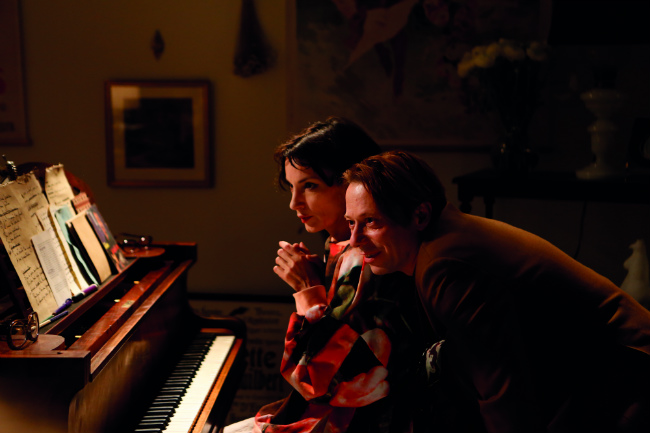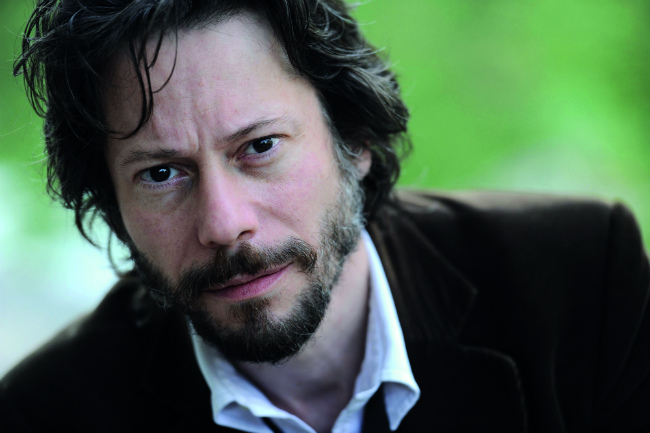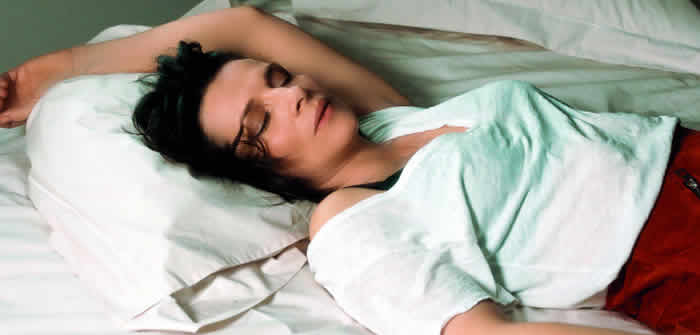In French director Claire Denis’s latest drama, Un beau soleil intérieur (Let the Sunshine In), the opening scene is a close-up of Isabelle (Juliette Binoche), her eyes closed in dreamy sexual rapture. She’s in bed with her lover, an arrogant, married banker (Xavier Beauvois), but the steamy atmosphere quickly veers into comedy when we realise that neither of them is really getting what they want.
Vincent puts his expensive suit back on, gazing at his mistress with an inscrutable smile and then exits with a resounding slam of the door. Isabelle’s eyes flicker with a range of contrasting emotions – affection, frustration and hurt – but the pain won’t stop her from seeing him again. Au contraire…
In fact, Isabelle, a divorced, fifty-something Parisian artist, is on a merry-go-round of fleeting joys, since the stream of unsuitable men she chooses to love invariably disappoint. Nevertheless, her tragi-comic determination to make each relationship work is touching and real. She is convinced that the love she so desperately desires is just around the corner.
TOUR DE FORCE
Premiered at the Fortnight of Directors during this year’s Cannes Film Festival, Let the Sunshine In was warmly praised by critics, who unanimously hailed Juliette Binoche’s performance as a finely nuanced tour de force. Indeed, the film goes beyond a mere bedroom farce; her portrayal of emotional registers that shift from laughter to tears in the blink of an eye is entirely believable.
Initially, director Claire Denis (Beau Travail, 1999; Les Salauds, 2013) set out to adapt Roland Barthes’s bestselling work, A Lover’s Discourse: Fragments, but soon abandoned the idea. Instead, she drew inspiration from Barthes’s fragmented elliptical sequences as a way of conjuring Isabelle’s episodic dalliances with wholly inappropriate men.
The most decisive factor, Denis says, was teaming up with renowned provocatrice and author Christine Angot (L’Inceste, 1999), who co-wrote the script. The film’s hilarious, acid-laced dialogues were painstakingly respected by all the actors. (“You are charming but my wife is extraordinary,” says Vincent to Isabelle, believing he is paying her a compliment).
“I knew I wanted to cast a sensual brunette,” Denis says. “I’ve known Juliette for a long time and even though we’ve never worked together, we both knew this was right for her. She stuck so closely to the script it was amazing – even when she stammers in disbelief with half-words, even quarters of words! It was all written in Christine’s dialogues.”
“I think we’re all desperate to love,” says Binoche with a smile, perched on the edge of a deep sofa. We’re sitting in a backroom at the UniFrance Pavilion in Cannes, where the 53-year-old actress is holding interviews. Dressed in bright red, her radiance is powerful even off-screen, from the warmth in her eyes to the luminosity of her flawless skin.
“Isabelle’s life is a disaster. She’s fragile, but that’s what makes her strong. She’s also daring, sexual and not afraid of her femininity. As an actor, I always try to find that weak spot, that place where the character has to protect herself from the things that are too painful.”
AMOROUS ENTANGLEMENTS
In the film, the series of amorous entanglements includes an impetuous actor (Nicolas Duvauchelle), a fellow artist (Bruno Podalydès), her ex-husband (Laurent Grévill) and a stranger she meets on a dance floor (Paul Blain).
“The way she gives herself to each man – she throws herself into a possible love until she realises that she can’t stand it any more – ends up putting her into a worse state of confusion.”
For Binoche, who shot the film in only five weeks, the collaboration with Claire Denis and the crew was an entirely joyous one. “I embraced the film like I embraced all the men in the film!” she giggles.
To prepare for the part, Binoche listened to Etta James and in one scene dances alone to James’s celebrated ballad At Last – an ironic counterpoint to Isabelle’s own dogged search for love.
One of the high points, she says, was shooting the final scene with Gérard Depardieu (with whom she recently made up after falling out over some comments Depardieu had made about her), who plays a wacky, flirtatious psychic. Torn in a thousand directions, Isabelle seeks his advice, but gets no answers.
“The psychic says one thing, then contradicts himself, and she believes it all. At one point in my life, when things weren’t going well, I had a similar experience with a psychic, so that scene amused me.”
“We were born to love,” she muses. “But we’re the ones who prevent love from coming.”
She pauses, taking a sip of water. “It’s a bit complicated, what I’m trying to say. True love is an illusion. You have to find the love of your life, the love of all things, in yourself. It can’t come from outside.”
And has she found that yet?
“I’m working on it!” Binoche laughs again, a deep, infectious peal that goes on for several seconds. Like Isabelle, the actress says she remains “open”.
“L’amour est là où on ne le voit pas.” Love is there where you don’t see it.

MATHIEU AMALRIC’S BARBARA
A loving tribute to France’s legendary singer, la Dame en Noir
Three years ago, director and actor Mathieu Amalric was having dinner with a film-maker friend, Pierre Léon – as they often did. When Léon asked him if he would be tempted to take over a long-term film project on the late icon of the chanson, Barbara, Amalric heaved a sigh.
“No,” he said. “Let’s leave Barbara alone. A biopic? Quite impossible!” But the more Amalric thought about the challenge, the more exciting the idea became.
One deciding factor in his change of mind was that the immensely talented actress Jeanne Balibar, Amalric’s ex-wife and mother of his two sons, was attached for the starring role.
A FILM WITHIN A FILM
Barbara morphed into a film within a film, holding a mirror to the legendary singer. Brigitte (Balibar) watches Barbara’s documented performances in black and white, imitates her speech inflections and mannerisms and strikes the piano with the same chords, humming the same melodies.
In short, Barbara is a deliciously chaotic, kaleidoscopic evocation of the singer’s life through a poetic juxtaposition of images.
As in his previous feature, On Tour, where the director also co-stars as the producer of a burlesque troupe, Amalric plays the role of a feverishly obsessed director, Yves Zand. We see him on the sidelines, consulting documents, conducting interviews of former friends of Barbara and listening to the singer’s recordings.
Ultimately though, all eyes are turned on Balibar, 49, whose striking resemblance to the singer she plays is riveting. During an hour and a half, the audience witnesses the fascinating process of an actress attempting to dissolve the borders between the real Barbara and her own interpretation.
“With Barbara, I knew I had to find a way to escape the traps of the biopic and turn the film into a huge playground for Jeanne, where she could be free,” Amalric says, gesturing effusively. The actor/director speaks slowly and deliberately, but there’s a mischievous glint in his eyes and an artless informality about him, as if he were shooting the breeze with friends.
“We didn’t want to simplify a life, give an explanation… I wanted to play with the genre, fall in love with it. Don’t forget that Rob Reiner’s Spinal Tap, Orson Welles’s Citizen Kane and Ken Russell’s Debussy are all biopics.
“I also really wanted to know how the music and lyrics came to Barbara, since she had no formal musical training,” the director adds.
And the fans couldn’t get enough of her. Barbara’s emblematic style – short-cropped Joan of Arc hair, heavily made-up eyes and dramatic black costumes with swirly capes, combined with a pure, tender voice – was unique. During the 1960s, and right up to her premature death in 1997, the singer produced a repertoire of deeply emotional songs (L’Aigle Noir, Nantes, Göttingen, Sid’amour à mort) about broken love, childhood memories, and death.
How did Balibar prepare for the role?
“Jeanne learned the piano and worked on the music for two years. She entered her world through chords, through harmonies,” says Amalric. “Jeanne is the sort of actress who is so free that she prefers not to know what’s going to happen, which is why she likes to work with me! It was like free jazz. She learned the script by heart, and many other things Barbara had once said, so she could use them at any moment, in any scene.”

ENORMOUS LIFE ENERGY
“I really didn’t have any idea of who Barbara was,” Jeanne Balibar says in a later interview. “But I never tried to come anywhere near her – that’s the job of the director and the editor. I just tried to be myself – and be alive – as much as possible, because Barbara had an enormous life energy. Mine needed to be as big as hers. And I knew all her texts by heart. Acting is like letting go of little balloons that fly in the air, but to begin with, you need to have a collection to work with.”
Above all, Amalric says that he shied away from the sensationalist clichés that helped to fuel the singer’s mystique. There are brief allusions to her childhood hiding from the Nazis, and her somewhat peculiar relationship with her mother, but audiences should not expect more than a glimpse of biographical facts.
“We didn’t know that she was raped by her father – we learned it from her unfinished memoirs – until after her death. I wanted the songs she sang to suggest things, like her choice of performing Georges Brassens’s Le Père Noël et la petite fille, which is loaded with sexual innuendos.”
Despite her cult status, Barbara is undoubtedly lesser known outside of France, but seems to be enjoying a surge back into vogue, now that everyone from Juliette Binoche to Gérard Depardieu is performing tributes to the singer.
As for Mathieu Amalric, his latest role as an actor will be in the forthcoming big-budget film Le Grand Bain, directed by Gilles Lellouche.
“I had so much fun – it’s about men’s synchronised swimming,” he grins. “We shot for three and a half months, at night.”
When asked if he’s also actively pursuing roles in English, Amalric is quick to reject any categorisation about his career. “I’ve done films with Julian Schnabel, Steven Spielberg and Wes Anderson, but they were all filmed in Europe. It’s always the world of the director that interests me, not his nationality or the scale of the film. It’s about pleasure, not budget.”
Amalric pauses, then grins.
“Maybe that’s why I love cinema. We are influenced by films that teach us how to live and love.”

